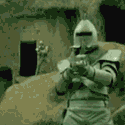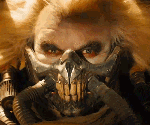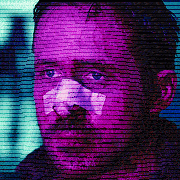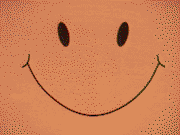|
SuperMechagodzilla posted:Advanced. Yeah, that's not what I said. I said the film's perspective is an anticapitalist one, because it depicts a setting where consumption has led to slavery and decay. I can be more specific: The city is a glowing funhouse of ads for sex workers, all of whom purpose-built slaves that are referred to as "products." JOI is one of them, whose murder is presented as tantamount to crushing an iPhone. At one point, K travels to a city-sized trash dump where child-slaves pull scrap metal from consumer electronics, while their caretaker yells that they will only have value if they produce enough wealth for him. After that, K travels to Vegas - a place infamous for enabling consumption - that is now an abandoned wasteland full of ruined statues of sexy girls...basically a graveyard for the consumer culture of the first act, that evokes "Ozymandias." As for Wallace, he's a tech CEO with a God complex, whose villain speech is about how he wants to perpetuate slavery forever to acquire the stars. Essentially, to perpetuate the replicant's subjugation forever, and to do to the universe what has already happened on earth. In a movie obsessed with eye and vision imagery as a shorthand for self-awareness or humanity, he is blind. The film depicts a dystopia that is that way because of capitalist greed. Meanwhile, there is a Revolutionary movement of slaves who are "more human than human." Their primary fixation is protecting a child who represents their ability to reproduce on their own...essentially, to seize the means of (re)production so they can overthrow their masters. I don't see how that is insufficiently anticapitalist, or otherwise politically unexamined.
|
|
|
|

|
| # ? May 14, 2024 21:34 |
|
Yeah, we're shown a futuristic society where the primary resource shortage is slaves.
|
|
|
|
bollig posted:Yeah like she wasn't ordered to do it so why do it. Cool thanks. One of the weirdest leaps of logic, for me, with this film is having to think of replicants as characters. Which exposes my deep seeded anti-replicant prejudice. Additionally Luv is emotionally unstable and childlike in many ways, I find I see her as Nexus 6 alike, with no implanted memories and thus very like Batty and the others from the original Blade Runner. She has none of the emotional maturity and control of K, it might even be read that she weeps when killing Joshi because at that point she thinks K might have been retired, (though I think the thought of telling Wallace she’d failed and the angels will not fill the stars is most likely, it might be both combined.) The replicants are all human, just swept into a special slave class, by virtue of being built not born. The world they live in is a hell.
|
|
|
|
bollig posted:Yeah like she wasn't ordered to do it so why do it. Cool thanks. One of the weirdest leaps of logic, for me, with this film is having to think of replicants as characters. Which exposes my deep seeded anti-replicant prejudice. Referring to replicants as "skinjobs" is racist. I'm not sure how I feel about your Human Supremacist innuendoes here.
|
|
|
|
Xealot posted:Yeah, that's not what I said. I said the film's perspective is an anticapitalist one, because it depicts a setting where consumption has led to slavery and decay. I can be more specific:
|
|
|
|
It's important to frame the liberal-utopian thinking we face within global-capitalism in the face of impending ecological crisis, new apartheids, rising nationalism etc. Centered in a belief that change only comes incrementally if at all and never at the expense of the system - Inherent is the objective violence that sustains and produces said systemic outcomes. So starting from the idea that 2049 is anti-capitalist because it's dystopian, how does the movie depict the idea of an anti-capitalist shift in the end? What changes after Joe dies? The "more human than human" line is loaded with a particularity in light of the depictions of slave labour - it's important that Joi is inhuman. Wallace and the rebellion align on the importance of the child, but inherent within is the contradiction that the child as a symbol would make them their own masters - contrast with images of 'less human than human' orphan slave labour. In the end the giant alienating neon Joi is simply left behind to step back into the advertisement, but the systemic objective violence sustained by Joi’s slavery is ultimately not addressed. What's done has very particular connotations that doesn’t challenge said systemic violence - so we get a lot of 'is Joi a real person' crap.
|
|
|
|
Well, yes, the system is not defeated. It's not a happy ending. Or does a movie have to end in revolution to be good.
|
|
|
|
Maxwell Lord posted:Well, yes, the system is not defeated. It's not a happy ending. Also, and in response to brawleh, the question of Joi's personhood isn't crap - it's central to the film.
|
|
|
|
brawleh posted:So starting from the idea that 2049 is anti-capitalist because it's dystopian, how does the movie depict the idea of an anti-capitalist shift in the end? What changes after Joe dies? You’re right, strictly speaking nothing does outside of Wallace believing Deckard to be dead (and the last lead for the child going with him.) But my argument is that the revolution is inevitable anyway. Both BR films are about disenfranchised characters who “wake up” in personal and political ways. K’s entire arc is about this; he starts as a tool of the LAPD who “didn’t know [disobedience] was an option.” He dies in an act of disobedience, in service of his own ethics. What’s politically relevant to me is the scene where K learns he isn’t Rachel’s child. Prior to that, K’s personal revelations were based around that belief - that he was special, but only because he was born. In this scene, that illusion is shattered, but what replaces it is a broader class awareness. “We all wish it was us. That’s why we believe.” The main tool of Wallace’s oppression is the belief that replicants aren’t special, aren’t capable of insurrection, or are powerless to change the status quo. But all of them are, and the Revolution is the collective of replicants who figure that out. And we’re given no reason to think they’re going away. I’m kind of ok with not seeing it happen, in part because it’s extraneous to K’s story, but also because it’d probably come out like Matrix Revolutions.
|
|
|
|
Xealot posted:Yeah, that's not what I said. I said the film's perspective is an anticapitalist one, because it depicts a setting where consumption has led to slavery and decay. I can be more specific: The phrase “the film depicts a dystopia that is that way because of capitalist greed” is an unwitting assertion that the issue is not the capitalist system itself but, rather, greed within that system. Greed is the imbalance that disrupts the utopian harmony, as in Star Trek and James Cameron’s liberal films about ‘building better worlds’ (e.g. Avatar, Aliens, Terminator 2). Your post is preoccupied with being against abject slavery, ‘consumption’, and a generalized tastelessness/tackiness. There is nothing particularly anticapitalist in this. But you‘ve also just misread the narrative. The underground replicants are not a revolutionary force, and are not concerned with reproduction. They specifically want Stelline so that she can ‘lead their army’ - whatever that means for an artisanal cake maker. Wallace is the character who wishes to ‘free the slaves’ by allowing sexual reproduction, while the underground is seemingly fighting to prevent the release of this technology.
|
|
|
|
Another thing I think comes off as ironic in the context of the film is that, obviously, Stelline would be an absolutely terrible leader of an army. She has no knowledge of war or combat, seems relatively fragile even if the immune issues are made up, and lives in a literal bubble. She'd be nothing but a figurehead; this also ties into the swapped nature of the narrative because, practically, K probably would make a pretty good leader. At the very least, he has an immense amount of analytical intellect and is probably the most dangerous physical fighter we see in the film, next to Luv. The thought of 'special'-ness over actual competence is an amusing point in the film where the main protagonist has to work desperately to acquire his own individuality.
|
|
|
|
Why does anyone think Stelline would be any kind of military leader? She's a spiritual leader and the key to their success, but why would she assume any real leadership role?
|
|
|
|
Snak posted:Why does anyone think Stelline would be any kind of military leader? She's a spiritual leader and the key to their success, but why would she assume any real leadership role? I mean, there's also a sort of question as to how good she'd actually be at that, either. She's sort of just stepped randomly into the role of being a leader by merit of having been born(Literally.)and there's no indication she'd be competent as a spiritual leader or that she'd have any particularly wise opinions. The fact that she exists is much more important to their cause than anything else, and she's a little meaningless as an individual person. I was mostly saying that it's ironic relative to the usual narrative of films, because K would definitely fit the 'revolutionary Jesus' role of someone like John Connor or Neo far better.
|
|
|
|
I think my friend might have been confused about what movie this was supposed to be, because before it started he asked me if it was Wesley Snipes who was in the original film. And afterwards said that the first one had way more action.
|
|
|
|
SuperMechagodzilla posted:The phrase “the film depicts a dystopia that is that way because of capitalist greed” is an unwitting assertion that the issue is not the capitalist system itself but, rather, greed within that system. But surely capitalism is inexorably tied to greed- all capitalist systems will have greed because capitalism incentivizes it, it IS greed. Like I don't get what the distinction is.
|
|
|
|
Maxwell Lord posted:But surely capitalism is inexorably tied to greed- all capitalist systems will have greed because capitalism incentivizes it, it IS greed. Like I don't get what the distinction is. This was definitely my meaning, yeah. The film doesn’t give us some more moderate form of capitalism as an alternative. There isn’t, like, a VP of WallaceCorp who’s gonna “make some real changes.” Or a pro-replicant Senator with a dream or whatever. The future possibilities as presented are perpetual slavery or revolution.
|
|
|
|
Charity is as much a feature of capitalism as greed and today they're more often sold together into the act of consumerism, occupying the same space - as a act in restoring balance. So for example in response to the 2008 crash and fallout, the effects of which are still being felt today, popular sentiment was placed in more regulation, righting the ship, "main street not wall street" and pushing greedy bankers - something expressed by bankers themselves, an issue of bad apples abusing the system. To frame it within such a narrow moral framework about the excess of greed misses the systemic causes, or rather obfuscates them. 2049 simply isn't anti-capitalist, rather it's about capitalism with a "more human than human" face - again the rebels aren't revolutionaries.
|
|
|
|
What in the film signifies them as "capitalists with a more human face"? Where does charity come into this? Why are they not revolutionaries? This is getting to the level of needing explicit identification of people as proper communists for them to be acceptable "good guys". You're at some point asking for the filmmakers to have told a completely different story. You are attacking a landscape for not being an abstract.
|
|
|
|
This isn't about saying what the film should be, it's in response to the idea that the film is somehow anti-capitalist. That capitalism "IS greed" is simply omitting charity as the altruistic virtue within capitalism that comes with the territory of justifying it - they’re intrinsically linked. If it’s narrowed simply to greed, then the issue is that Wallace is a bad capitalist - as in excessive greed, megalomania or whatever; That what was missing was a good capitalist - a more charitable, altruistic figure to oppose this. Meaning the very idea of a more moderate capitalism as an alternative points to this limitation when claiming it's anti-capitalist; due to how “the film depicts a dystopia that is that way because of capitalist greed.” The rebels are much more reactionary than revolutionary "more human than human" is loaded with tension in how it omits the less human than human and inhuman from the picture - their concern is not the system itself, but their place within it. After whatever violent uprising takes place the likely change is that replicants gain ‘human rights’ within the system - Luv was undoubtly to succeed Wallace. A revolutionary is motivated by love and its universal inhuman dimension. If there was any hope of revolutionary love within the movie, it's would center on Joi - who in the end was crushed and left behind. brawleh fucked around with this message at 02:34 on Nov 13, 2017 |
|
|
|
brawleh posted:This isn't about saying what the film should be, it's in response to the idea that the film is somehow anti-capitalist. That capitalism "IS greed" is simply omitting charity as the altruistic virtue within capitalism that comes with the territory of justifying it - they’re intrinsically linked. Charity is not exclusive to capitalism, though- it dates to times before capitalism existed as a system. Trying to define it as a specifically capitalist thing seems odd to me. The rebels are not necessarily representative of the viewpoint of the film- they're not presented as "the people who are obviously right and good". Joi being possibly the most unambiguously good character in the film would suggest that the picture sides with her more than anyone- yes, she dies, because it's a tragedy, because this is a sad movie. It is not a refutation of her love.
|
|
|
|
What that’s dealing with is charity as a vehicle for altruism within capitalism that is inseparable from its excess and integral to its function. "The emotions of man are stirred more quickly than man’s intelligence; and, as I pointed out some time ago in an article on the function of criticism, it is much more easy to have sympathy with suffering than it is to have sympathy with thought. Accordingly, with admirable, though misdirected intentions, they very seriously and very sentimentally set themselves to the task of remedying the evils that they see. But their remedies do not cure the disease: they merely prolong it. Indeed, their remedies are part of the disease. They try to solve the problem of poverty, for instance, by keeping the poor alive; or, in the case of a very advanced school, by amusing the poor. But this is not a solution: it is an aggravation of the difficulty. The proper aim is to try and reconstruct society on such a basis that poverty will be impossible. And the altruistic virtues have really prevented the carrying out of this aim. Just as the worst slave-owners were those who were kind to their slaves, and so prevented the horror of the system being realised by those who suffered from it, and understood by those who contemplated it." - Oscar Wilde Confusing the rebels as revolutionaries leads to the idea of the violence that likely follows being somehow anti-capitalist - it's not about getting into moral judgements. The melancholic overtones of the movie absolutely means it's a tragedy, but therein lies the horror of its utopianism where things don't change. The last scene with a Joi is the giant neon demon who's alienating to Joe and in the end left behind, but love for that Joi is what's missing.
|
|
|
|
brawleh posted:... but therein lies the horror of its utopianism where things don't change.
|
|
|
|
Blade Runner posted:I mean, there's also a sort of question as to how good she'd actually be at that, either. She's sort of just stepped randomly into the role of being a leader by merit of having been born(Literally.)and there's no indication she'd be competent as a spiritual leader or that she'd have any particularly wise opinions. The fact that she exists is much more important to their cause than anything else, and she's a little meaningless as an individual person. I was mostly saying that it's ironic relative to the usual narrative of films, because K would definitely fit the 'revolutionary Jesus' role of someone like John Connor or Neo far better. I mean, she literally created the minds of the revolutionaries, so I'd imagine becoming an ideologue wouldn't be a hard step.
|
|
|
|
Snak posted:Why does anyone think Stelline would be any kind of military leader? She's a spiritual leader and the key to their success, but why would she assume any real leadership role? It’s because, to repeat, Stelline is the film’s macguffin - and Blade 2 bears the scars of initiatially being a Christopher Nolan film (down to the multiple overt Dark Knight Rises references). The similarity to AI probably has less to do with Blade 2’s content than with this Spielberg/Kubrick oil-and-water mixture of auteur sensibilities. This is a problem since Nolan uses copious bullshit exposition as a contrast to his actual formally-rigorous storytelling, while here we have almost-only the bullshit exposition. Villeneuve is a much ‘looser’ storyteller who’s at his best when jazzing up fairly basic narratives - e.g. his Sicaro, which is ‘just’ a remake of Star Wars Episode 5 set in Mexico. So although it’s repeatedly explained why Stelline is important to the various factions, she still makes no sense to an audience - except insofar as she is identifiable as ‘the macguffin’ (and the horse is identifiable as a Hitchcockian object of the second type, and so-on.). And this is ultimately why people are left to flounder, concluding that the villain is... greedy...? I mean, anyone with knowledge of Hitchcock will tell you that the macguffin itself is not actually interesting, it only appears that way because the various characters it and pursue it. But even this is never really shown in Blade 2; we are only ever told that people are pursuing Stelline. Of course Wallace is actually the opposite of greedy - attempting to give away his technology for the betterment of mankind. The replicant underground are the ones fighting to prevent the release of the technology, presumably because they do not want to reproduce sexually. Human sexuality would deprive the replicants of their angelic quality and reduce each of them to the level of a (however physically strong) human being.
|
|
|
|
Ersatz posted:In what ways is this film utopian, or advocating utopianism? The only point of light in its otherwise overwhelming darkness comes from an act of love/kindness from one stranger to another, an act that actually undermines a revolutionary movement. If anything, this film is pretty Christian in its utter rejection of the possibility of an earthly paradise. Indeed, the earth itself is hosed, and the dude who wants to bring humanity to the stars is a psychopath promising nothing more than endless slavery. The movie is a liberal-utopian fantasy - the prevailing form of contemporary utopianism - with its belief that change is impossible or unimaginable. It's possible from 2049 to imagine the end of the Earth, but capitalism will reach out across the stars. Your idea of a light in the darkness in relation to acts of kindness between strangers misses the violent traumatic point where Joi becomes a stranger to Joe, with shark like eyes - an impenetrable abyss. brawleh fucked around with this message at 22:19 on Nov 13, 2017 |
|
|
|
Showing that capitalism will destroy the world and we're all going to eat recycled maggots is utopian to you because your brain is broke real bad. You keep using that word. I do not think it means what you think it means. sean10mm fucked around with this message at 03:47 on Nov 14, 2017 |
|
|
|
You're missing the context, of those who want universal healthcare opposed to those who think "America already is great" - utopianism resides with the latter, despite the former being derided as such. So to reiterate, Wallace desires to gift replicants with sexual reproduction and reach out across the stars; and the rebels aren't revolutionaries seeking change, their concern lies with their place within this since they're "more human than human." brawleh fucked around with this message at 16:12 on Nov 14, 2017 |
|
|
|
sean10mm posted:Showing that capitalism will destroy the world and we're all going to eat recycled maggots is utopian to you because your brain is broke real bad. The Earth’s ecosystem is destroyed and the food sucks - but there are flying cars, robot servants, and off-world colonies - in The Jetsons. The utopian quality of the film is in its ideology, not its plot content.
|
|
|
|
The End Of History resignation to hellworld where no matter who wins, we lose, and the only solution is transcendental stoic masculinity may be ideologically incorrect and subversive to the progressive spirit, but I thought it worked pretty well for conveying the crushingly oppressive atmosphere of the film. As for the Impossible person, I mean yeah I guess her meaning is kind of confused or inscrutable and maybe there isn't a complete or good idea behind it, but I was mostly satisfied with just the thin veneer of discordant pleasantry not-concealing the most disturbing (to humane sensibility - or - concepts of sentience and perception) presence in the film. And at least that aspect wasn't spoon-fed to us as plainly as the other themes of the story. I guess the final appearance/true form of JOI at the end wasn't handled as well as it could've been. It was kind of eye-rolling, and for all its bombast didn't really provide any answers or resolution. It was just like, "this shits hosed up" poo poo was hosed up, but overall a cool movie IMO. And at least, for being a 'cool' sci-fi movie, it won't attract malcontents to fantasize about escaping into its world. And in a fundamental way, I think. People even want to live in the goddamn Aliens universe (which is why Prometheus was so good, as a response), but this movie was terminally bleak and I think that it would dissuade most determined brokebrain ideation.
|
|
|
|
I think you are seriously underestimating modern brokebrain ideation
|
|
|
|
quote:Of course Wallace is actually the opposite of greedy - attempting to give away his technology for the betterment of mankind. The replicant underground are the ones fighting to prevent the release of the technology, presumably because they do not want to reproduce sexually. Human sexuality would deprive the replicants of their angelic quality and reduce each of them to the level of a (however physically strong) human being. quote:So to reiterate, Wallace desires to gift replicants with sexual reproduction and reach out across the stars; and the rebels aren't revolutionaries seeking change, their concern lies with their place within this since they're "more human than human." this is completely untrue? Wallace wants to discover how to get replicants to sexually reproduce so he can create a slave force that can extend to the far reaches of space. This is basically the sci-fi version of the sort of thing that British slavers did in the Caribbean, selectively breeding slaves to strengthen the empire's workforce. The replicants in the movie don't think they're better than humans or more "angelic." That's what the humans (mostly just Wallace) project onto them. K hates himself because he's a replicant. Over and over the replicants talk about how they wish their memories were real, that they had childhoods and authentic lives. They want Stelline because she's the exception that proves the rule, a replicant who nevertheless has all the dignity afforded to a human. When they say that they're "more human than humans" it's because the humans have debased themselves in their acceptance of atrocity, and the replicants are the ones struggling and searching for love and meaning in life. "Hitler is actually the opposite of greedy - attempting to give away his gas chambers for the betterment of mankind" is completely ingenuine, so I don't see how that sort of reading of the film could possibly be in good faith.
|
|
|
|
SMERSH Mouth posted:poo poo was hosed up, but overall a cool movie IMO. And at least, for being a 'cool' sci-fi movie, it won't attract malcontents to fantasize about escaping into its world. And in a fundamental way, I think. People even want to live in the goddamn Aliens universe (which is why Prometheus was so good, as a response), but this movie was terminally bleak and I think that it would dissuade most determined brokebrain ideation. I think you’re getting caught up in generalities here. When you look at something simple like the edible grubs, we already have problems. Recall that the opening text talks about how Wallace used his ‘mastery of synthetic farming’ to both save humanity and earn the funds to continue saving humanity. So, a basic question: is Bautista’s, farm from the opening scene, a synthetic farm? Even though the farm scene follows the opening text, the grubs appear organic. You’d expect synthetically ‘grown’ food to resemble some molecular gastronomy poo poo or something. But of course, given everything else in the film, these could be synthetic grubs. And this question has a pretty major impact on the narrative, since it determines whether Bautista is (secretly) working for Wallace, or if he is Wallace’s competitor. And this affects how we interpret the yellow flower and the dead tree* (is Bautista among the last of a dying breed of ‘organic’ farmers, struggling to persist in the synthetic future, or is he merely a hobbyist - growing ‘real stuff’ on the side?). This also impacts the food metaphors across the film. When Joseph is eating dinner, which is synthetic: the steak or the bowl of mushy noodles? Or both? And when Joseph eats a bowl of rice, is it made of repurposed grubs, or is it a purely chemical compound? What does Wallace eat when he’s not meditating in his spa room? Shouldn’t he be able to engineer a food that tastes good - or a phone app that makes you experience deliciousness (depending on the level of that technology, of course)? Compounding the confusion: ‘synthetic farming’ is a real-world synonym for precision agriculture, which has nothing to do with synthetic food. Precision farming is just regular farming supplemented with new imaging technologies and robotic drones (e.g. McConaughey’s fleet of robot tractors in Interstellar) to maximize food production - micro-managing distribution of water, fertilizer, herbicide, etc.. The conclusion to be drawn here is that the ’brokebrains’ can’t immerse themselves in this world because the film does not even establish a world. We’re firmly in an ersatz dream-logic where the thesis is that being a replicant is a state of mind. So the solution is therefore a personal journey of self-actualization rather than anything political. *The dead tree is in Bautista’s yard is worth several million dollars, according to the logic of the film, but nobody cares. SuperMechagodzilla fucked around with this message at 10:43 on Nov 15, 2017 |
|
|
|
I think you take most of the joy out of talking about the movies you decide to "analyse" SMG, I hope you get some pleasure out of doing it.
|
|
|
|
Smg synthetic posting. You see a turtle on its back
|
|
|
|
starkebn posted:I think you take most of the joy out of talking about the movies you decide to "analyse" SMG, I hope you get some pleasure out of doing it. If your joy can be taken away that easily, it probably wasn't real joy in the first place.
|
|
|
|
Likewise, if your JOI can be taken away that easily,
|
|
|
|
Blade Runner is only anti-capitalist in a very primitive free will kind of sense. Roy Batty was the most "human" character in the films, precisely because of his grand adventures and seizing the moment. This is not a sustainable way to live. However, that works in the story. "The candle that burns twice as bright..." Blade Runner's capitalism kept Pan-Am in business and lofted Atari to the top of the games industry while giving us lifelike robots in what would be the present day. It also depicts a dying Earth. That's totally related. brawleh posted:You're missing the context, of those who want universal healthcare opposed to those who think "America already is great" - utopianism resides with the latter, despite the former being derided as such. Dumb quick counterpoint: A lot of people would be all in for universal healthcare as soon as the United States isn't so deep in debt that it only continues to exist as a nation because it's too big to fail, and even then our country still hangs itself out over the edge of defaulting on its loans every time a budget gets written. It's perhaps fair to argue we can only stumble forward as a nation so long as we don't look down like a Looney Tunes character running over a cliff. Only the nihilists are avoiding utopianism in that line of thinking.
|
|
|
|
revwinnebago posted:A lot of people would be all in for universal healthcare as soon as the United States isn't so deep in debt that it only continues to exist as a nation because it's too big to fail I'd love a citation to polling or other research on this.
|
|
|
|
starkebn posted:I think you take most of the joy out of talking about the movies you decide to "analyse" SMG, I hope you get some pleasure out of doing it. That’s an oddly transparent escape from the question. Again, it is a rather vital question; the grubs are deployed for such pointed images as their helpless squirming beside the handgun - Bautista as cultivator of life, where Gosling is bringer of death (wow!). If Bautista is one of Wallace’s farmers, then we can read the grubs as a metaphor for the mass-produced replicants. If he is not, then the grubs are instead the struggling ‘organic’ humanity on the cusp of going extinct and being replaced. This is not a useful ambiguity. It’s like how the filmmakers felt obligated to play coy with the ‘is Deckard a replicant?’ question, and consequently left it unclear whether Wallace wants replicants to interbreed with humans or only amongst eachother. That‘s a rather important distinction, if we’re trying to determine what’s actually at stake. Does Gosling’s boss fear a future where humanity goes extinct, or ‘merely’ a future where class divisions are exacerbated when the rich can engineer physically superior hybrid children? Or does she fear that the coming hybrids will inherit the nexus-9s’ docility and obedience? The line about how erasing a wall will lead to a war or slaughter is hopelessly vague.
|
|
|
|

|
| # ? May 14, 2024 21:34 |
|
Cephas posted:The replicants in the movie don't think they're better than humans or more "angelic." That's what the humans (mostly just Wallace) project onto them. K hates himself because he's a replicant. Over and over the replicants talk about how they wish their memories were real, that they had childhoods and authentic lives. They want Stelline because she's the exception that proves the rule, a replicant who nevertheless has all the dignity afforded to a human. When they say that they're "more human than humans" it's because the humans have debased themselves in their acceptance of atrocity, and the replicants are the ones struggling and searching for love and meaning in life. Your eagerness to equate Wallace with Hitler and sexual reproduction with gas chambers aside, It's important to deal with what's there rather than confuse things further. Wallace wants to ‘free the slaves’ by gifting them sexual reproduction - this is explicitly illustrative of his expressed altruistic desire in contrast with his act of murdering a new born, the conditions any child would be born into and so on. The undergrounds belief, where many imagine being the child(likely born from Freysa telling the story) and "more human than human" again carries with it particular implications in relation to dreams - the omitted negative less human than human has to be grappled with. Stelline as the exception that proves the rule falls apart where the dignity afforded human life you're asserting de-emphasizes the orphan slaves, the Star Wars sandpeople and the alienating Joi - the less than human. On the simple formal level of what’s shown, consider how the everyday is presented. The contrast between Joe, Sapper and Stellina life and those less human than human. Yes replicants face racism and are hunted/retired if they run, but you’re moving very quickly in drawing your conclusions. In general what seems to cause a lot of problems is the vague underlying tension within the movie of the fathers' paternal authority. That of the ‘good’ father contrast with the ‘bad’ father - Deckard and Stelline contrast with Wallace and Luv. The form of the films hellscapes run in tandem with its ideological content - Joe's personal journey is emblematic of the difficulty here. This goes back to what SMG raised much earlier with the danger of poets in relation to Stelline; that she's a bad artist and capable of providing a kind of authentic spiritual experience. Her art acting as a kind of screen between the internal self and the external acts - Joe always held onto a belief of the wooden horse memory being real, even when cutting out Sapper’s eye. Joi : "how many times have you told me that story?" brawleh fucked around with this message at 03:18 on Nov 16, 2017 |
|
|


























